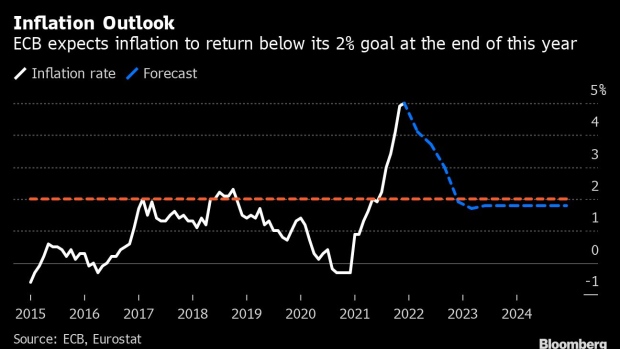Jan 26, 2022
Inflation Outlook No Reason for ECB to Change Track, Simkus Says
, Bloomberg News

(Bloomberg) -- Sign up for the New Economy Daily newsletter, follow us @economics and subscribe to our podcast.
The European Central Bank has no need to fundamentally change its assessment of the inflation outlook or accelerate policy tightening, according to Governing Council member Gediminas Simkus.
Euro-area monetary policy can’t be compared with the U.S. or other jurisdictions “because the economic situation is different,” the Lithuanian central bank chief said in an interview. That means an increase in interest rates is far from being on the ECB’s agenda, even as the Federal Reserve prepares for a March hike.
“There is uncertainty, and I agree it has increased,” Simkus said on Tuesday. “But I don’t have evident facts that the projections have changed so substantially that we should start discussing whether the inflation outlook has changed to one that’s far beyond our 2% objective.”
Italian bonds held their gains following the report and their German counterparts stayed lower, leaving the 10-year yield spread two basis points narrower at 135.
Economists and investors recently pulled forward expectations on when the ECB will raise interest rates. Money markets are now pricing an October hike, while researchers at Deutsche Bank see one in December. Most analysts still don’t anticipate rates rising before 2023, however, and even more hawkish Governing Council members have said it’s unlikely to happen this year.
Read more in our decision day guide: Fed to Signal March Interest-Rate Liftoff
Pressure on the central bank is building after inflation in the euro area reached a record 5% last month. Yet Simkus said recent developments are “more or less in line with our projections” -- even if risks are “to the upside.”
The ECB’s policy path -- which was last updated in December and foresees a slowdown in asset purchases over the course of 2022 -- does not need to change “yet,” he said.
“If the question is what if the information changes and if the ECB is ready to act to the changed economic environment, then my reply would be yes,” he added.
The 43-year-old central banker -- the youngest member on the ECB’s 25-member Governing Council -- said it’s increasingly difficult to properly judge the economic outlook. He described geopolitical tensions at Ukraine’s borders as “an even bigger uncertainty” than the omicron strain of the coronavirus.
Read more: ECB’s Simkus Warns of Major Economic Risk From Ukraine Tensions
He also reiterated that the ECB should end its asset-purchase programs “shortly” before it begins raising borrowing costs.
“From a credibility point of view I think it’s important to keep that sequence,” he said. But “I would refrain from putting a number of days or weeks or months on that time frame.”
(Updates with market reaction in fourth and fifth paragraph)
©2022 Bloomberg L.P.